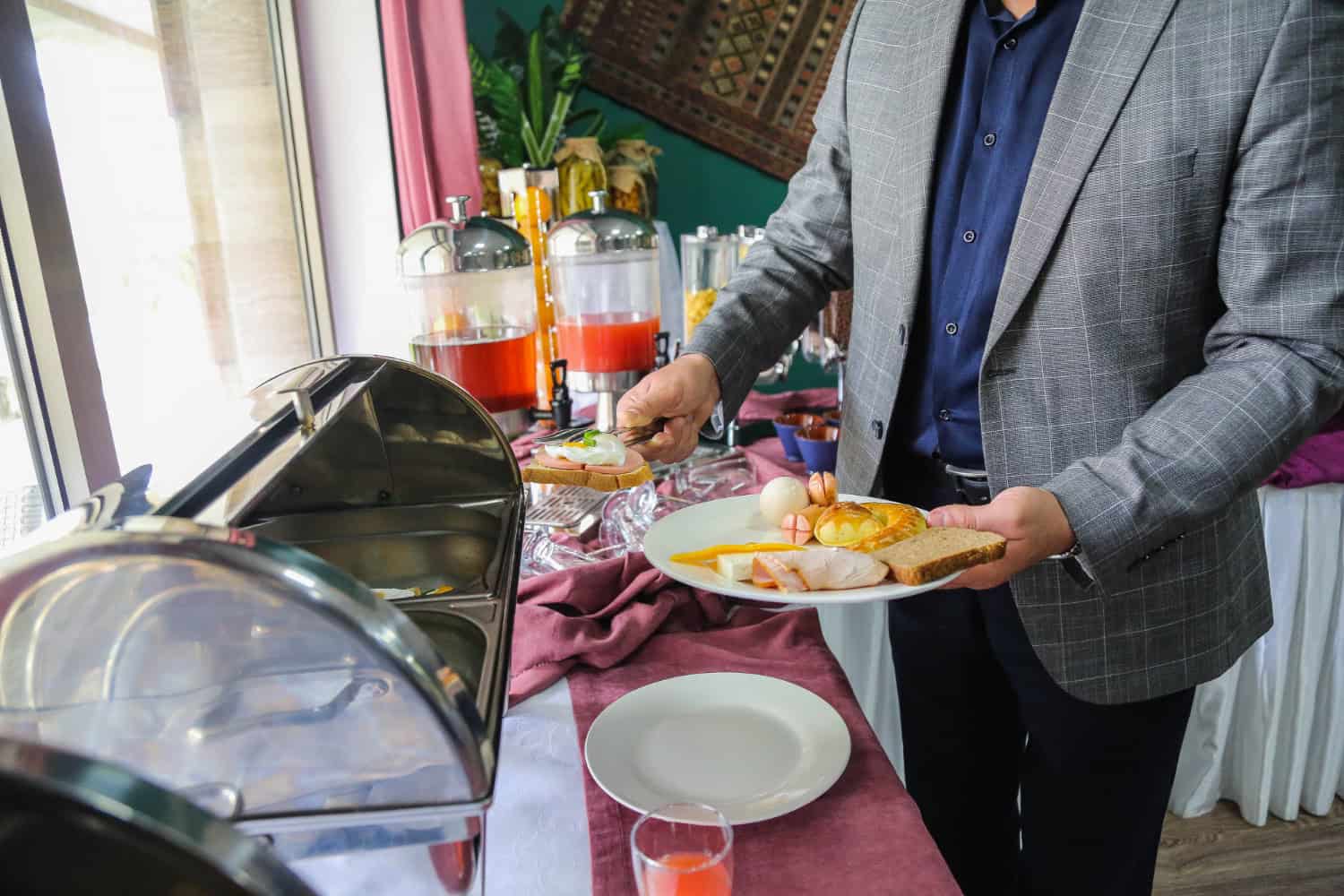
By Jermaine Thomas April 30, 2025
Food is often at the heart of corporate events and office gatherings. It brings people together, creates a welcoming atmosphere, and can leave a lasting impression on attendees. However, when planning meals for a diverse group, inclusivity becomes critical. Ensuring that all dietary needs are met demonstrates respect and thoughtfulness. It also ensures that everyone, regardless of their dietary preferences or restrictions, feels valued and included. Inclusive menu planning is not just a trend; it is now an essential part of modern business hospitality.
Why Inclusive Catering Matters in Corporate Settings
Today’s workforce is more diverse than ever. Employees and clients come from various cultural, religious, and health backgrounds. This diversity impacts food choices and requirements. By planning inclusive menus, businesses can foster a sense of belonging and promote a positive workplace culture.
Ignoring the need for dietary accommodation can alienate participants and send an unintended message of exclusion. On the other hand, thoughtfully curated menus show that your organization cares about individual needs and strives to create a welcoming environment for all.
An inclusive office lunch also enhances the overall event experience. When everyone feels considered, they are more likely to engage, collaborate, and enjoy themselves. For companies that value team building and client relationships, inclusive catering is a small investment with big returns.
Common Dietary Needs to Consider
Understanding the range of dietary needs is the first step in creating inclusive menus. Some of the most common include vegetarian, vegan, gluten-free, dairy-free, nut-free, halal, kosher, and low-sugar or low-carb diets.
In addition to dietary preferences, allergies and intolerances must be taken seriously. A nut allergy, for instance, is not just a preference but a potentially life-threatening condition. Proper labeling and separation of food items are critical when managing allergy concerns.
Faith-based dietary practices, such as halal or kosher requirements, should also be acknowledged and respected. Offering at least a few clearly marked options for these groups ensures that no one feels left out.
Adopting corporate catering tips that emphasize variety, labeling, and transparency allows planners to meet a wide range of needs without overwhelming themselves or the catering team.

Early Communication Is Key
The best way to ensure effective dietary accommodation is to communicate with attendees ahead of time. Event invitations and RSVP forms should include questions about dietary restrictions and preferences.
This proactive approach allows planners to gather important information without making assumptions. It also gives employees or guests the chance to express their needs privately and respectfully.
Clear communication with the catering company is equally important. Share the list of dietary needs with the caterer well in advance and work together to design a menu that balances inclusivity with practicality.
Many catering services now offer specialized menus that accommodate common dietary restrictions. Choosing a provider experienced in inclusive office lunch events can make the entire process smoother.
Tips for Building an Inclusive Office Lunch Menu
When planning an inclusive office lunch, simplicity and variety are your best allies. Rather than trying to create a completely separate dish for every dietary preference, offer flexible options that naturally cater to multiple needs.
Buffet-style layouts work well because they allow individuals to choose what suits them best. Include a mix of meat-based, vegetarian, vegan, and gluten-free dishes. Ensure there are at least a few substantial options for each major dietary group.
Label everything clearly. Signs should indicate if a dish is vegan, gluten-free, contains nuts, or meets halal or kosher requirements. Labels help attendees make informed choices without needing to ask staff or guess.
Focus on whole foods and simple preparations whenever possible. Grilled vegetables, quinoa salads, fruit platters, and lean protein dishes are generally safe bets that appeal to a broad audience.
Including an assortment of beverages such as sparkling water, herbal teas, and non-dairy milk options also shows attention to detail and enhances the inclusive atmosphere.
Following these corporate catering tips ensures that every participant finds something delicious and appropriate for their needs.
Partnering with the Right Caterer
Choosing a caterer experienced in inclusive menu planning can make a world of difference. Look for catering companies that ask about dietary restrictions upfront and offer customizable menus.
An ideal catering partner will suggest practical solutions, offer transparent ingredient lists, and understand the nuances of religious and allergy-related dietary needs.
If possible, schedule a tasting or request sample menus before finalizing your order. This step helps ensure that the quality and presentation meet your expectations for the inclusive office lunch.
Also, confirm how the caterer handles cross-contamination risks, especially for severe allergies. Good caterers take food safety seriously and have protocols in place to protect all guests.
A strong partnership with a thoughtful caterer simplifies planning, builds trust, and ensures a positive dining experience for everyone involved.
Inclusive Menus Beyond the Main Course
Inclusive menu planning does not stop at entrees. Appetizers, desserts, and snacks should also reflect a range of dietary considerations.
Offering a vegan or gluten-free dessert option alongside traditional choices allows everyone to enjoy a sweet treat. Similarly, providing nut-free snacks or dairy-free cheese boards creates moments of joy without excluding anyone.
Small touches like offering a plant-based protein option for appetizers or featuring fruit and veggie platters as alternatives to heavier hors d’oeuvres demonstrate commitment to inclusivity.
Every part of the dining experience contributes to the overall atmosphere. Taking the time to plan beyond the main course reinforces your commitment to corporate catering tips focused on inclusion.
The Impact on Company Culture and Branding
An inclusive office lunch is not just about food. It sends a message about your company’s values, priorities, and attention to detail.
Employees who feel seen and respected are more likely to be engaged, loyal, and productive. Clients and partners notice these details too. Inclusive catering can enhance your reputation as an organization that cares about diversity, equity, and inclusion.
Food is a powerful connector. Inclusive meals break down barriers, encourage conversations, and strengthen relationships across teams and departments.
In competitive industries where talent retention and client trust are key, these small gestures can create significant advantages.
Embedding inclusivity into your food planning is an easy and effective way to align your hospitality practices with your organizational mission and branding.

Overcoming Common Challenges
Inclusive menu planning is rewarding but not without its challenges. Balancing budget constraints, guest expectations, and catering logistics requires careful coordination.
One way to manage costs is to prioritize flexibility over offering an exhaustive menu. A few well-chosen, high-quality options are often better than trying to cover every possible preference with separate dishes.
Transparency also helps manage expectations. Communicate to attendees what accommodations have been made and encourage anyone with complex needs to reach out individually.
If an event has many unique dietary requests, consider offering a base menu and supplementing with a few individualized meals as needed. This approach respects both the group’s needs and the event’s budget.
Learning from each event and gathering feedback from guests allows for continuous improvement. Building inclusive food practices takes time but pays off in stronger relationships and a more welcoming environment.
Conclusion
Inclusive menu planning is not just a courtesy; it is a strategic move that enhances the success of corporate events and the quality of workplace culture. Paying attention to corporate catering tips, understanding the dynamics of an inclusive office lunch, and taking dietary accommodation seriously shows employees, clients, and partners that your organization values every individual. Through early communication, thoughtful menu design, strong partnerships with caterers, and an emphasis on transparency, businesses can create memorable, welcoming events where everyone feels they belong.
Inclusive catering is a reflection of modern business values. By making the effort to meet diverse dietary needs, companies demonstrate leadership, build goodwill, and strengthen their communities from the inside out. Investing in inclusive menu planning today lays the foundation for a more connected, respectful, and thriving organization tomorrow.